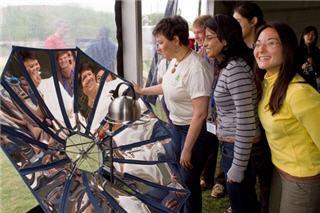Ways to Collaborate with EPA
From small-business grants to research partnerships to competitions and internships for students, we support creative thinkers and the ideas that could transform our world.
Citizen Science
Citizen science is a vital, fast-growing field in which scientific investigations are conducted by volunteers. This builds on the long tradition of individuals and community groups collecting data to better understand their local environment and address issues of concern.
Next-Generation Air Monitoring
Low-cost, portable air sensors have the potential to revolutionize air quality monitoring.
Developer Central
This resource is for developers interested in building applications using EPA data.

Apply for Small Business Innovation Research (SBIR) grant
The program funds small businesses and helps translate innovative ideas into commercial products that address environmental problems.
Compete in People, Prosperity and the Planet (P3)
College students compete to design solutions for a sustainable future.
Apply for a fellowship
EPA offers several funding opportunities for students and researchers.
Intern with the Green Chemistry program
This program designs chemical products and processes that reduce or eliminate the use or generation of hazardous substances.
License EPA technology or enter into cooperative research partnerships
CRADAs allow non-federal partners to leverage EPA’s scientific facilities, resources and knowledge.
